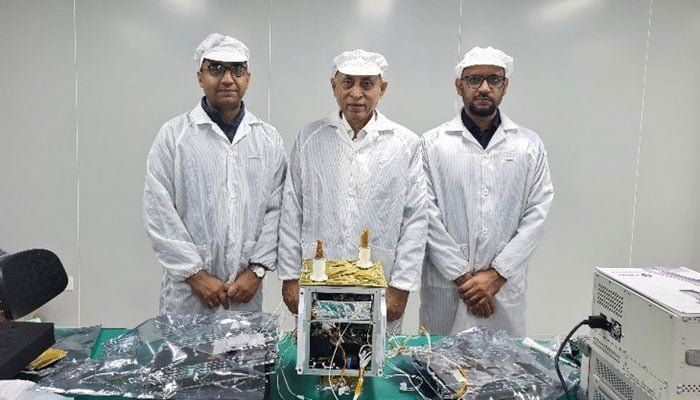In a groundbreaking move, Pakistan is gearing up for its first-ever lunar mission, ICUBE-Q, scheduled to launch on May 3rd, Friday.
In a groundbreaking move, Pakistan is gearing up for its first-ever lunar mission, ICUBE-Q, scheduled to launch on May 3rd, Friday. The mission will be piggybacking on China’s ambitious robotic exploration endeavor, the Chang’e 6 mission, set to depart from Hainan, China. This significant development was reported by the Associated Press of Pakistan (APP) on Tuesday.
The launch event promises to be a momentous occasion, with live coverage streaming on the website and social media platforms of the Institute of Space Technology (IST). The primary objective of the mission is to gather lunar surface samples from the far side of the Moon, which will subsequently be brought back to Earth for extensive research purposes.
ICUBE-Q, the satellite at the heart of this mission, stands as a testament to Pakistan’s growing prowess in space technology. Developed through a collaborative effort between IST, China’s Shanghai University SJTU, and Pakistan’s national space agency SUPARCO, ICUBE-Q represents a significant milestone in Pakistan’s space exploration journey.
The inclusion of Pakistan’s CubeSat Satellite, ICUBE-Q, underscores the country’s commitment to space exploration and scientific advancement. CubeSats, renowned for their compact size and standardized design, have emerged as invaluable tools in scientific research, technology innovation, and educational initiatives within the realm of space exploration.
Pakistan’s participation in this lunar mission not only showcases its burgeoning capabilities in space technology but also solidifies its partnership with China in advancing global scientific research and technological development. This collaborative effort highlights the synergy between nations in harnessing the potential of space exploration for the betterment of humanity.
As the countdown to launch day begins, anticipation and excitement are palpable among scientists, engineers, and space enthusiasts alike. The successful execution of Pakistan’s historic lunar mission alongside China’s Chang’e 6 mission holds the promise of unlocking new frontiers in lunar exploration and fostering international cooperation in the pursuit of scientific excellence.
With eyes turned skyward, the world eagerly awaits the unfolding of this momentous event, which has the potential to leave an indelible mark on the annals of space exploration history. As Pakistan ventures into the cosmos, it takes a bold stride towards realizing its aspirations of reaching for the stars and unraveling the mysteries of the universe.
